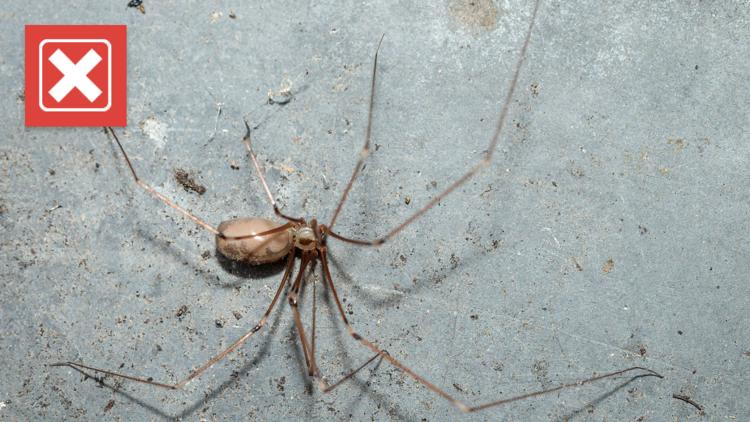For decades, people have spread the rumor that daddy-long-legs are the most venomous spider. But the spiders’ venom isn’t strong enough to hurt people.


Daddy-long-legs, which look like spiders with thin legs much longer than their bodies, are generally seen as harmless. But according to many versions of a popular rumor, daddy-long-legs are actually among the most venomous of all spiders but their fangs are too small to bite humans.
Questions about whether daddy-long-legs bite, if the spiders are venomous or poisonous, and if they are the most venomous spider are also among the most popular Google searches about daddy-long-legs in the last 20 years.
THE QUESTION
Are daddy-long-legs one of the most venomous spiders?
THE SOURCES
THE ANSWER
![]()
No, daddy-long-legs are not one of the most venomous spiders.
WHAT WE FOUND
While “daddy-long-legs” could refer to a few different creatures, only one of which is actually a spider, none of them produce venom that’s potent enough to harm people.
When people refer to a daddy-long-legs spider, they’re most likely referring to a cellar spider or a harvestman, which is an arachnid but isn’t actually a spider, according to the University of California, Riverside Department of Entomology. The two may look similar from a distance, but cellar spiders have two distinct segments of their body while harvestmen have just one.
In either case, they are not dangerous. Harvestmen don't produce venom and can't bite people because they don't have fangs, UC Riverside says.
Like almost all spiders, cellar spiders do produce venom, according to the Burke Museum, a natural history museum in the state of Washington. But most spider venom has little to no effect on humans. The Burke Museum says only about 25 out of around 50,000 known spider species have venom that can make people sick.
Cellar spiders are not among those 25 species. The Missouri Department of Conservation also calls cellar spider venom “relatively mild” compared to most spiders.
Rick Vetter, a retired UC Riverside entomologist, told UC Riverside that he isn’t aware of any publication that shows cellar spider venom is toxic to humans.
“I think one scientist did some work on that, and he had a little black mark for a day or two and went, 'It's not that big of a deal,'” Vetter said. “Definitely not the most toxic spider in the world.”
It’s also a myth that cellar spiders don’t have big enough fangs to bite people. Cellar spiders have similar fangs to brown recluse spiders, which can bite people and are dangerous, UC Riverside says.
This part of the myth is a little more true for the other kind of daddy-long-legs, harvestmen. The mouthparts of these arachnids are too small to bite people, the Missouri Department of Conservation says.
Finally, many people who share this rumor say that daddy-long-legs are the most “poisonous” spider, not the most venomous spider. If something is poisonous, it’s toxic to eat or touch. If something is venomous, it has a toxic bite.
Again, this is where the myth holds a little more truth for harvestmen than for cellar spiders. When harvestmen are disturbed, they either spray or coat themselves in a dark, foul-smelling chemical meant to ward off parasites and predators, UC Riverside says.
This substance can kill spiders and insects, but UC Riverside says “it's certainly not the world's most toxic poison” to humans.
The VERIFY team works to separate fact from fiction so that you can understand what is true and false. Please consider subscribing to our daily newsletter, text alerts and our YouTube channel. You can also follow us on Snapchat, Instagram, Facebook and TikTok. Learn More »
Follow Us
Want something VERIFIED?
Text: 202-410-8808
.png)









 English (US) ·
English (US) ·